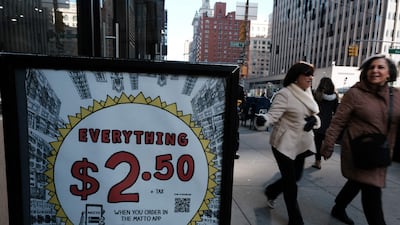Prices in the US remained stubbornly high but inflation eased slightly last month, further muddying the Federal Reserve's next interest-rate decision as the collapses of Silicon Valley Bank and Signature continue to have ripple effects across the global market.
The Consumer Price Index rose 0.4 per cent in February from January, the Labour Department reported on Tuesday. On an annual basis, prices increased by 6 per cent, which was down from 6.4 per cent in January.
The index for shelter accounted for 70 per cent of the increase, the Labour Department reported. The indexes for food, recreation and household earnings also contributed to the increase.
Core inflation, which excludes food and energy prices, grew by 0.5 per cent from January and increased by 5.5 per cent on the year.
President Joe Biden was encouraged by Tuesday's report but also noted recent fears over a potential banking crisis after SVB's collapse.
"As I’ve long said, and as challenges in the banking sector remind us, there will be setbacks along the way in our transition to steady and stable growth," he said.
Inflation remains well above the Federal Reserve's 2 per cent target and Tuesday's labour data puts the Federal Reserve in a difficult position. The central bank had appeared poised to speed up the pace of its interest-rate increases and even surpass its estimated peak rate, but the collapses and continued fallout of SVB Bank and Signature are likely to have profound consequences.
SVB collapsed last week after selling roughly $22 billion worth of securities at a loss following the Fed's rate increases. Customers rushed to withdraw their funds from the midsized lender after it had sought to raise funds to meet withdrawal demands.
The collapses of the two banks bring into question whether the Fed should reduce the size of its next interest-rate increase next week, or even pause it altogether.
Traders had anticipated the Fed would raise interest rates by 50 basis points at the conclusion of its March 21-22 meeting, but the Fed is now expected to take a more cautionary approach after the US experienced the second- and third-largest retail bank failures in its history.
“The collapses of Silicon Valley Bank and Signature will undoubtedly weigh on the Fed's mind, with opinion divided on whether the Fed should pause rate hikes immediately”, said Neal Keane, head of sales trading at brokerage ADSS.
Mr Keane said a 25-basis-point is the most likely scenario, with further rises likely.
Traders have pencilled in a 90 per cent chance that the Fed will raise interest rates by 25 basis points next week.
Goldman Sachs analysts at the weekend said they did not expect an interest-rate increase next week, citing stress in the banking sector.
Wall Street's main indexes gained over expectations of a smaller interest-rate increase.
The Dow was up 302 points, or 0.95 per cent, as of 10.14am EST. The S&P 500 and Nasdaq climbed 1.62 per cent and 1.86 per cent.
Meanwhile, regional bank stocks rebounded after plunging on Monday. Shares of First Republic Bank climbed nearly 53 per cent before trading was temporarily halted.
The KBW, which tracks publicly traded banks and thrifts was up nearly 5 per cent.


